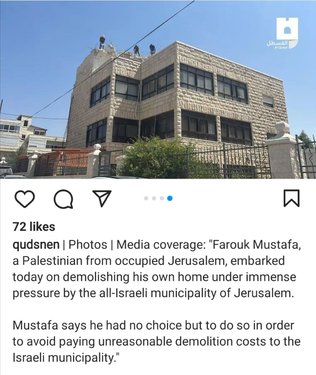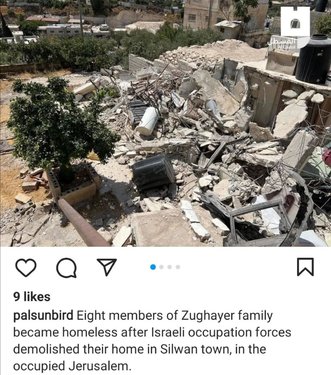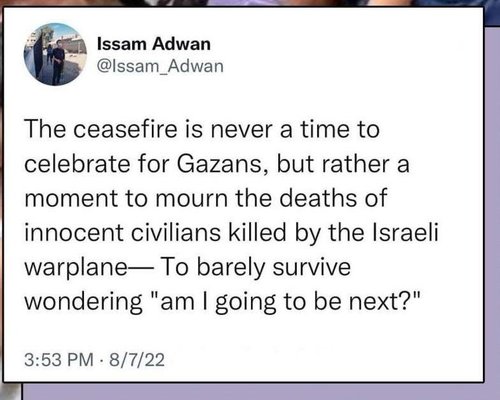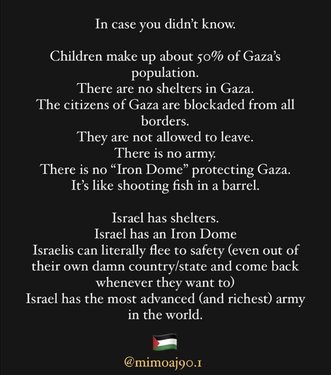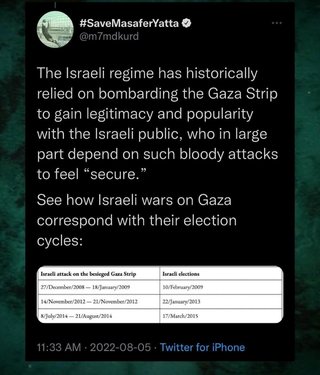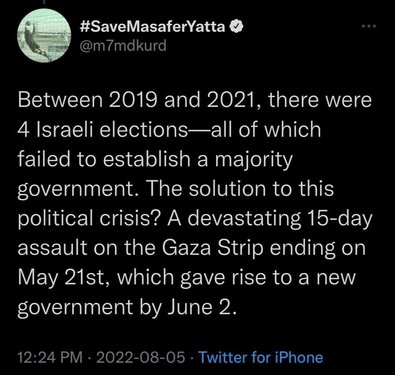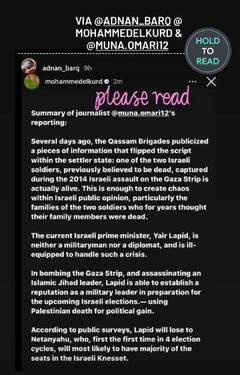-
Posts
8,465 -
Joined
-
Days Won
773
Content Type
Profiles
Forums
Events
Everything posted by ummtaalib
-
"Palestinian administrative detainee in Israeli jails #KhalilAwawdeh flashes victory sign after reaching an agreement with the Israeli occupation authorities to suspended his hunger strike, which continued for 172 days, and to release him on 02 Oct 2022." https://www.instagram.com/p/Ch7tvPFsAkn/
-
Ongoing Isra-helli oppression... Destruction of olive trees continues The Israeli occupation forces destroy around 100 olive trees in the village of Gwuen, southern Hebron hills. 25.8.2022 www.instagram.com/p/ChsEVRuleSL/ Death preferable to detention without charge or trial The European Union: "Shocked by the horrific images of Khalil Awadeh, who has been on hunger strike for 179 days in protest against his detention without charge, as he is facing imminent risk of death, and we call for his immediate release." Settler violence Uri Shouri, an Israeli settler threatened a Palestinian family with a machete on a road in northern "Israel". The mother, father and their child were in the family car. (Video shows terrified, crying child while the settler is seen shouting with the machete in his hand) www.instagram.com/p/Ch15ALGKrPl/ Back to school with just one eye "With the beginning of the new school year in Palestine, Palestinian student Arij Asaliya returns to her school with only one eye after she lost her right eye in an Israeli airstrike during the recent Israeli onslaught on Gaza." www.instagram.com/p/Ch1l43Dqi1z/ Continued ethnic cleansing of Masafer Yatta The whole world needs to watch what I just saw: "Israelis" preventing a group of 10-year-olds, on their way to school with teachers, from entering their OWN VILLAGE because the Israeli Occupying Forces made it a "firing zone". All families face ethnic cleansing in Masafer Yatta for this reason. www.instagram.com/p/Ch6dxuTj6XH/ This is how sick the Apartheid regime is in 2022: A kid detained, in the 3rd grade, in front of a tank, just because he lives in Masafer Yata. The "firing zone" is a hoax, it was declared with the purpose to evict us, Ariel Sharon said in a secret document recently uncovered. In May, occupation court ruled: mass eviction of Masafer Yatta. The reason? The army wants our land to make a training zone. Since then: schools got demolition orders, kids detained daily, family homes razed every week. Settlers growing around us. www.instagram.com/p/Ch6gx2SMU1j/ Settler thugs pepper-spray my friend, a shepard, and hit him with stones. He yells for help. Soldiers come. What do they do? Throw stun grenades at us who came to film. Apartheid could not be uglier in Masafer Yatta and Palestine. www.instagram.com/p/CgFQF1iKxEJ/ Military raids, house demolitions, arrests without charge and trial, settler violence, apartheid.... Palestine: "Not trending but still suffering"
-
There was once a man who lived 2km from a river which was the closest water source to his home. Every morning, the man would take two buckets, trek the 2km distance to the river, fill his buckets with water, and then undertake the laborious journey home. However, there was one problem – both of his buckets had a hole. Hence, on arriving back home, the man would notice that the buckets were only half full. Since this man only possessed these two buckets, it was not an option for him to increase the number or size of his buckets. Thus, he decided that the prudent decision would be for him to plug the leaks so that for the same amount of effort, he would have more water at home. The above illustration may be fictitious, but it demonstrates a pertinent point that applies to most people at present. In these trying times, when the cost of essential goods and services has skyrocketed astronomically, then together with trusting in Allah Ta‘ala to look after us and provide for us, each and every person should try to ‘plug the leaks’ in his bucket. Allah Ta‘ala is the Sole Provider, and He has given every one of us our ‘bucket’ – our decreed sustenance. Since our bucket is pre-decreed by Allah Ta‘ala, we cannot increase the amount in our buckets. However, what we CAN do is identify the avenues in which we are extravagant or wasteful and curb this unnecessary expenditure which is putting a strain on our finances. In the Quraan, Allah Ta‘ala describes the believers who are His special servants and friends. One of their special, praiseworthy qualities which Allah Ta‘ala highlights is their moderation in expenditure. Allah Ta‘ala says: “And (they are) those who when they spend, they are neither extravagant nor miserly, and it (their spending) is moderate between that (the two extremes).” (Surah Furqaan V: 67) In yet another verse of the Quraan, Allah Ta‘ala advises us to be moderate in our expenditure, and warns us of the difficulties that we will create for ourselves if we adopt either extreme (wastefulness or miserliness), saying: “And do not keep your hand tied to your neck (i.e. being miserly and not spending on one’s needs and the needs of one’s family, etc.), nor extend it to the full extent (i.e. being extravagant and wasteful), lest you should be sitting reproached, empty-handed.” (Surah Banu Israaeel V: 29) In the blessed hadeeth, Rasulullah (sallallahu ‘alaihi wasallam) has encouraged the Ummah to be moderate in their spending saying, “The one who is moderate in his spending will never fall into poverty.” (Tabraani - Majma‘uz Zawaa-id #17798) In another hadeeth, Rasulullah (sallallahu ‘alaihi wasallam) said, “It is a sign of a man’s intelligence that he is moderate in his expenditure.” (Musnad Ahmad #21695) In regard to falling into wasteful, extravagant or unnecessary expenditure, then in today’s times, some of the areas where most people suffer a loss are the following: 1. Social Media – It is an undeniable fact that one of the primary uses of social media is that of advertising. Accordingly, all and sundry use social media to advertise their products. The result of this is that a person who frequents social media platforms is constantly bombarded with advertisements. Suddenly, a product which a person managed to live without for many years becomes a ‘necessity’ which must be purchased. 2. Online shopping – Before the advent of online shopping, remaining at home was a sure way to avoid shopping and save cash. However, with online shopping, one’s email inbox is filled with ‘Daily Deals’ and app notifications repeatedly pop-up notifying a person of some new promotion, thus tempting one to buy something he does not require. Hence, one person mentioned that after deleting all the shopping apps on his phone, he found that he began to save R2500 a month. 3. Special Offers and Sales – The market places (e.g. shopping malls) should be avoided as far as possible, as the hadeeth mentions that these are the places which are most detested and abhorred by Allah Ta‘ala. One of the harms of frequenting these places is that one is tempted by the sales that are held. On seeing the sign “50% Reduced!” a person rushes into the store, convinced that if he does not seal the deal, he will lose out. Little does he realise that in order to ‘save’ 50%, he is first required to spend 50%, and many a time, he merely wants the item because it is on sale – not because he actually needs it. 4. Eating Out – Many housewives are able to attest to the fact that a simple meal of baked beans and bread, or dhall (lentils) and roti, can fill and sustain a family of five for under R50. In stark contrast to this is the exorbitant price that people pay when ordering food from restaurants, etc. where each person sometimes pays up to R100! While we are not advocating that people live solely on beans and dhall, we must certainly exercise moderation, as eating out on a weekly basis can easily cost R2000 a month – if not more. We must remember that even if Allah Ta‘ala has given us the means due to which we are able to lead a lavish lifestyle at present, it is not guaranteed that we will always be able to maintain this lifestyle. We have seen many people lose their fortunes in mere moments, after which they were compelled to tighten the purse strings. At that challenging time, when the standard of living was suddenly lowered, many of them, and their families, fell prey to depression, etc. as they were not accustomed to leading a simpler lifestyle. Therefore, if we raise our children in an environment of extravagance and accustom them to this type of opulent lifestyle, then over and above the sin of extravagance, and ingratitude shown to Allah Ta‘ala by wasting the wealth He has given us – we are doing our children a grave disservice. After all, the day our daughters are married and leave our homes, if their husbands are unable to cater to their expensive tastes, it will place a strain on their marriage which may ultimately result in a divorce and broken home. Thus, we understand that plugging the leaks is not only for our own benefit, in Deen and dunya – but it is also for the benefit of our children and families. May Allah Ta‘ala bless us all with contentment, and assist us to curb all wasteful and extravagant expenditure, Ameen. UswatulMuslimah
-
Women in Islam Gender equality Position of women before eIslam Position of women after Islam Rights of women In terms of worldly administration Provision for women under all circumstances and much more in a concise newsletter.... Ihyaauddeen.co.za newsletter_17_web - WOMEN.pdf
-
Sayyidah Ummu Maalik (radhiyallahu ‘anha) was a Sahaabiyyah of Rasulullah (sallallahu ‘alaihi wasallam) from the Ansaar of Madeenah Munawwarah. She would sometimes bring a leather bag filled with ghee and present it to Rasulullah (sallallahu ‘alaihi wasallam) as a gift. On one occasion, when she brought the bag of ghee to Rasulullah (sallallahu ‘alaihi wasallam), he instructed Sayyiduna Bilaal (radhiyallahu ‘anhu) to empty the bag and return it to her. Hence, Sayyiduna Bilaal (radhiyallahu ‘anhu) emptied the bag, even squeezing it until all the ghee had been extracted from inside the bag. He thereafter returned the bag to her. On taking the bag back, Sayyidah Ummu Maalik (radhiyallahu ‘anha) found that it was full of ghee! This caused her great concern, as she feared that Rasulullah (sallallahu ‘alaihi wasallam) had perhaps rejected her gift on account of him receiving revelation regarding her (i.e. her wealth being contaminated, or her actions not being accepted, etc.). Hence, she came to Rasulullah (sallallahu ‘alaihi wasallam) and asked, “O Rasul of Allah (sallallahu ‘alaihi wasallam)! Have you received any revelation in my regard?” Rasulullah (sallallahu ‘alaihi wasallam) responded by asking her, “Why do you ask?” She replied, “You have returned my gift to me!” Rasulullah (sallallahu ‘alaihi wasallam) thus called Sayyiduna Bilaal (radhiyallahu ‘anhu) and asked him (whether he had accepted the gift and emptied the ghee as instructed). Sayyiduna Bilaal (radhiyallahu ‘anhu) replied, “I take an oath by that Being Who has deputed you with the truth! I squeezed the bag (empty) until I even felt embarrassed!” Hearing this, Rasulullah (sallallahu ‘alaihi wasallam) addressed Sayyidah Ummu Maalik (radhiyallahu ‘anha) and said, “May you find enjoyment in it, it is barakah (blessings from Allah Ta‘ala), O Ummu Maalik! It is barakah, the reward of which Allah Ta‘ala has (granted you and) swiftly shown you (in this worldly life).” Rasulullah (sallallahu ‘alaihi wasallam) thereafter taught her to recite “Subhaanallah”, “Alhmadulillah” and “Allahu Akbar” ten times each after every salaah. (Al-Isaabah vol. 8, pg. 468) In another narration, it is mentioned that when the children of Sayyidah Ummu Maalik (radhiyallahu ‘anha) would ask her to give them something to eat with their bread (as gravy), and at that time she did not possess anything to give them, she would go to the leather bag which she would use when giving ghee to Rasulullah (sallallahu ‘alaihi wasallam) as a gift. Allah Ta‘ala had placed such barakah in the ghee that she would always find some ghee in it. One day, Sayyidah Ummu Maalik (radhiyallahu ‘anha) decided to squeeze the bag (in order to extract as much ghee as she could), but as soon as she did so, the ghee seized to come out. She thus came to Rasulullah (sallallahu ‘alaihi wasallam) and informed him that the ghee had stopped. Rasulullah (sallallahu ‘alaihi wasallam) asked her, “Did you squeeze the bag?” When she replied in the affirmative, Rasulullah (sallallahu ‘alaihi wasallam) said, “Had you left it (without squeezing it), it would have continued (to come out, as it was barakah from Allah Ta‘ala).” (Saheeh Muslim #5945 and Takmilatu Fathil Mulhim) Note: In this narration, Rasulullah (sallallahu ‘alaihi wasallam) taught Sayyidah Ummu Maalik (radhiyallahu ‘anha) to recite “Subhaanallah”, “Alhamdulillah” and “Allahu Akbar” ten times each after every salaah. However, in other narrations, it is reported that Rasulullah (sallallahu ‘alaihi wasallam) had taught Sayyidah Faatimah (radhiyallahu ‘anha) to recite “Subhaanallah” thirty-three times, “Alhamdulillah” thirty-three times and “Allahu Akbar” thirty-four times after every salaah. The ‘Ulama explain that it is permissible for one to practice on both of these narrations, though it will be more rewarding for one to recite the tasbeeh taught to Sayyidah Faatimah (radhiyallahu ‘anha) in which “Subhaanallah” is recited thirty-three times, “Alhamdulillah” thirty-three times and “Allahu Akbar” thirty-four times. Lessons: 1. The Sahaabah (radhiyallahu ‘anhum) had the greatest love in their hearts for Rasulullah (sallallahu ‘alaihi wasallam), and this love brought them abundant goodness and blessings in this world and the next. They were always prepared to sacrifice their lives, wealth and desires for the sake of Rasulullah (sallallahu ‘alaihi wasallam). We must make du‘aa to Allah Ta‘ala to bless us with such love for Rasulullah (sallallahu ‘alaihi wasallam) that translates into following every aspect of his beautiful lifestyle. We must also recite abundant durood upon Rasulullah (sallallahu ‘alaihi wasallam). In this way, we will also enjoy goodness and blessings in our lives as well. 2. Despite the Sahaabah (radhiyallahu ‘anhum) being the esteemed companions of Rasulullah (sallallahu ‘alaihi wasallam), and their high rank being mentioned in the Quraan Majeed, they were never complacent regarding their Deen and Imaan. Rather, they always regarded themselves to be nothing and feared for the safety of their Imaan and the acceptance of their actions. UswatulMuslimah Jamiatul Ulama (KZN) Council of Muslim Theologians
-
Q. A girl is getting married and wants to use the patch as a contraceptive. Is it permissible for her to use the patch given the fact that whilst making ghusl, water won’t penetrate that area? (Question published as received) A. A Contraceptive Patch is a small sticky patch applied to the skin that releases synthetic estrogen and progestogen hormones into the body to prevent pregnancy. In normal circumstances, this is permissible to apply and use. In terms of Ghusl, if the Contraceptive Patch has not been applied due to a genuine need and there are suitable alternatives available, the performance of Ghusl will not be valid whilst the Contraceptive Patch is applied to the skin. It will have to be removed whilst performing Ghusl for the Ghusl to be valid. And Allah Ta’ala Knows Best Mufti Ismaeel Bassa Mufti Moosa Salie (The answer hereby given is specifically based on the question asked and should be read together with the question asked. Islamic rulings on this Q&A newsletter are answered in accordance to the Hanafi Fiqh unless otherwise stated.) Fatwa Department Jamiatul Ulama (KZN) Council of Muslim Theologians
-
Israeli occupation closes down 7 Palestinian human rights and humanitarian organizations Media coverage: "Offices of at least 7 Palestinian civil and human rights organizations were stormed and sabotaged by Israeli forces in Ramallah early this morning. The forces also confiscated office items and machinery from the headquarters." These photos were taken from Defence for Children International, Palestine.
-
Turkey, Israel to restore full diplomatic relations Move comes after gradual efforts to restore ties, including a visit by the Israeli president to Turkey in March. Turkey and Israel have agreed to restore full diplomatic relations and will return ambassadors to each other’s countries following a gradual improvement in relations. The announcement on Wednesday followed a conversation between Israeli Prime Minister Yair Lapid and Turkish Prime Minister Recep Tayyip Erdogan. It comes four years after the two countries expelled ambassadors over the killing of 60 Palestinians by Israeli forces during protests on the Gaza border against the opening of the United States Embassy in Jerusalem. “It was decided to once again upgrade the level of the relations between the two countries to that of full diplomatic ties and to return ambassadors and consuls general,” a statement from Lapid’s office said. “Upgrading relations will contribute to deepening ties between the two peoples, expanding economic, trade, and cultural ties, and strengthening regional stability,” it added. Turkish Foreign Minister Mevlut Cavusoglu told reporters in Ankara that the appointment of ambassadors was “one of the steps for the normalisation of ties”. “Such a positive step came from Israel, and as a result of these efforts, and as Turkey, we also decided to appoint an ambassador to Israel, to Tel Aviv,” he said. Cavusoglu added that the move did not mean that Turkey would be abandoning the Palestinian cause. “We have always said we will continue to defend the rights of Palestine, Jerusalem and Gaza. It’s important that our messages are conveyed at the ambassadorial level in Tel Aviv,” he said. The thaw in ties comes after more than 10 years of tensions. A visit to Turkey by Israeli President Isaac Herzog in March, followed by visits by both foreign ministers, helped warm relations. Al Jazeera’s Resul Sardar, reporting from Istanbul, said economic and security factors were at play. “In one year, there will be a presidential election here in Turkey. But with inflation at more than 70 percent, Ankara wants to attract investment from regional countries. There are security challenges, too, in Syria and the eastern Mediterranean basin. Turkey sees Israel as a strong player, and for Israel, Turkey is seen as a balancing power in a region threatened by Iran.” But even with the full restoration of diplomatic ties, the Palestinian issue was likely to remain a “contentious difference” between the two countries, he added. The move, which comes as Israel has sought to improve ties with regional powers, was agreed upon two years after the so-called Abraham Accords which saw relations normalised between Israel, Bahrain, the United Arab Emirates (UAE) and Morocco. Turkey also launched a charm offensive in 2020 to repair ties with estranged rivals, making overtures to Egypt, the UAE and Saudi Arabia. Efforts with Cairo have so far yielded little progress, but officials have said normalisation work with Riyadh and Abu Dhabi are going well. Al-Jazeera
-
-
A Journey Through Salah Ṣalāh is a unique act of worship involving every one of our body parts. Every requirement and component of ṣalāh has its own impact, its own flavour and experience. Every action and statement have their own form of servitude (ʿubūdiyyah) to Allah (ʿazza wa jall). The journey through ṣalāh is remarkable. Each part is a unique milestone, bringing its own **sweetness** (ḥalāwah) and joy. Ṣalāh combines the recitation of the Qur’ān, dhikr and duʿā’. Each one of these is an extremely praiseworthy act of worship outside of ṣalāh. Ṣalāh, however, combines all three acts in one setting. Moreover, ṣalāh is an act where you simultaneously worship Allah (ʿazza wa jall) using your tongue, body and heart. Ṣalāh differs from fasting, zakāh and ḥajj in that we are obligated to perform ṣalāh every day; not once but five times. Praying five times a day allows us to renew our pledge to Allah (ʿazza wa jall) five times a day. As humans, we immerse ourselves in this world and, therefore, tend to forget Him. As soon as we are about to drown in our heedlessness (ghaflah), ṣalāh intervenes, offering a lifeline that pulls us swiftly out of it. The sins perpetrated in between the prayers take us away from Him, harden our hearts and stop us from being true slaves. Ṣalāh is, therefore, our ‘spiritual cleanser’, expiating the sins committed between two prayers. This chapter will take you on a journey through ṣalāh, exploring the secrets and significance of each posture, along with their various adhkār. Attending The Court Of The Almighty If you are going to meet an important leader or king, you will make sure that you are prepared. You will shower, perfume and wear your smartest clothes. When preparing for ṣalāh, you are actually preparing to meet the King of all kings: Allah (ʿazza wa jall) Himself. The Messenger of Allah ﷺ said, “When one of you performs ṣalāh, let him wear both of his garments, for Allah is most worthy of being adorned for” (Bayhaqī). Studies in psychology and science have shown that what you wear affects your behaviour and mental state. Allah (ʿazza wa jall) says, “O Children of Ādam, take on your adornment at every place of worship.” (7:31). Commenting on this āyah, the scholars have mentioned that it is praiseworthy to adorn oneself, apply perfume and use miswāk in preparation for ṣalāh. Doing this will: 1. Give us reward for acting upon the Sunnah. 2. Prepare us, mentally and psychologically, for ṣalāh. 3. Helps us give ṣalāh its due importance and seriousness, and thereby improve the quality of our ṣalāh. Adorn yourself for the honour of meeting Allah (ʿazza wa jall), al-Aʿlā (The Greatest). Preparing yourself in such a manner should be out of your humility and respect for Him, not out of personal vanity or pride. Miswāk The Messenger of Allah ﷺ said, Reflect Just as you cover your body in ṣalāh (satr al-ʿawrah), Allah (ʿazza wa jall), the Concealer of sins (al-Sittīr), covers your sins. Remembering your sins (of which only Allah (ʿazza wa jall) knows) should invoke shyness in you, and fill your mind with remorse and embarrassment. It should make you lower your head and turn to Him in the manner befitting of a sincere repentant slave. Source
-
Israel admits to killing 5 children in a raid on a cemetery in Gaza Israel admitted responsibility for killing five Palestinian children in an air strike on the Fallujah cemetery in the town of Jabalia, in the northern Gaza Strip, on 7 August, after it had initially claimed they were killed as a result of a missile fired by Islamic Jihad. "Israeli defence officials have confirmed that Israel was responsible for the deaths of five minors killed on the last day of the recent hostilities with Islamic Jihad this month," reported Haaretz newspaper today. "An army inquiry into the incident, which occurred on August 7 in the Al-Faluja Cemetery east of Jabalya, has concluded that the minors were killed by an Israeli airstrike, several defence sources have confirmed," added the newspaper. It also reported that "Immediately after their deaths, several senior officers said the five were most likely killed by a misfired Islamic Jihad rocket." On the other hand, the newspaper indicated that an army investigation concluded that another incident, which resulted in the killing of eight Palestinian civilians, including children, that occurred on a day earlier was a result of a "misfired Islamic Jihad rocket." The newspaper stated: "The Palestinians had claimed the eight were killed by Israel, but the army quickly released evidence indicating that they were actually killed by Islamic Jihad." Israeli army spokesman Ran Kochav said: "We didn't conduct any strikes in that area, not in urban areas and not at that time." The five victims in the air strike on the cemetery were identified as Jamil Al-Din Nijm, 3, Jamil Ihab Nijm, 13, Mohammad Salah Nijm, 16, Hamed Haidar Nijm, 16, and Nathmi Abu Karsh, 15. Over the course of three days from 5-7 August, the Israeli army launched raids on the Gaza Strip, which, according to the Palestinian Ministry of Health, resulted in the death of 49 people, including 17 children and four women, and 360 injuries. Source
-
A Summary of the Creed of the Ahlus Sunnah wal Jama’ah Regarding the Sahaabah (radiyallahu anhum) in Light of the Quraan & Sunnah Mufti Taahir Hansa – Jamiatul Ulama KZN Midlands THE IMPORTANCE OF CORRECT AQEEDAH While people in general focus on the visible structure of a building above the ground and admire its design and architecture, the architects and engineers have to ensure that the foundation is rock-solid or else the entire beautiful structure collapses as a heap of worthless rubble. Exactly is the case with the faith of Islam. The structure of Islam, with all its pillars, rests on a foundation of correct beliefs that are explicitly established from the Quran and Authentic Traditions of Prophet Muhammad sallallahu alayhi wa sallam. Without the foundation of correct Aqeedah, the actions and deeds of a person will not be of benefit to him. The beliefs and practices of a Muslim, must be in conformity with the Quraan and Sunnah in order to be worthy of acceptance by Allah. THE MEANING OF THE TERM AHLUS SUNNAH WAL JAMA'AH Ahlus Sunnah Wal Jama'ah literally translates as ‘the people of the way and the group’ and broadly refers to Muslim orthodoxy and consensus. The ‘way’ signifies that of the Prophet and the ‘group’ refers to his noble companions (Sahaabah radiyallahu anhum), and their successors (Taabi’een) and those after them represented by the main spectrum of Muslims in every age who followed in their footsteps. THE SAHABAH RADIYALLAHU ANHUM ARE THE YARDSTICK OF TRUTH AND THE FOUNDATION OF RELIGION Allah has classified the Imaan of the Sahaabah radiyallahu anhum to be the ideal. He made a similitude of their Imaan and encouraged the people to have Imaan in the same way as them. Allah says: فَاِنْ اٰمَنُوْا بِمِثْلِ مَآ اٰمَنْتُمْ بِهٖ فَقَدِ اهْتَدَوْاۚ If they have Iman just as you have Iman, then they are rightly guided. [Surah al Baqarah: Verse 137] This means that the Imaan and conviction of the Sahaabah radiyallahu anhum has been classified as the standard of truth for others to believe. It is obvious that their Imaan meets the Divine criterion, it is only then that it was made worthy of being the exemplar. Sayyiduna Abdullah ibn Amr radiyallahu anhu narrates that Rasulullah Sallallahu alayhi wa sallam said: “The Jews split into seventy one or seventy two factions; and likewise the Christians. My Ummah will split into 73 factions. All of those factions will be in the Fire (of Jahannam) except one.” The companions asked: “Who are they, O Messenger of Allah?” The Prophet sallallahu ‘alayhi wa sallam replied: "Those that follow my way and that of my companions." [Sunan Tirmidhi: Hadith 2641] In this hadith, the standard of truth and falsehood has not only been classified to be the path of Rasulullah sallallahu ‘alayhi wa sallam, but together with this, the path of the Sahabah of Rasulullah sallallahu ‘alayhi wa sallam has been classified to be the standard of truth. Rasulullah sallallahu ‘alayhi wa sallam has also explained that the path of his Sahaabah radiyallahu anhum is exactly his path and following them is a means of salvation. It is thus established that together with Rasulullah sallallahu ‘alayhi wa sallam, the Sahaabah radiyallahu anhum are also the standard and yardstick of truth. Virtue and excellence in any action is attained through adherence to the commands of Allah Ta'ala and Sunnah of Rasulullah sallallahu ‘alayhi wa sallam. Virtue and excellence in actions cannot be achieved based on our own desires and preferences. The imperative need to follow the Sahaabah of Rasulullah sallallahu ‘alayhi wa sallam in understanding the Sunnah can never be over emphasised. The Sahaabah radiyallahu anhum are the fundamental basis and foundations on which the superstructure of the Shariah has been raised. They represent the pivot upon which the wheel of Islam revolves. The Sahaabah radiyallahu anhum cannot be divorced from the Sunnah and vice versa. Without the reports, comments, interpretations and rulings of the Sahaabah radiyallahu anhum it is not possible to correctly understand the Qur'aan and the sacred utterances and practices of Rasulullah sallallahu ‘alayhi wa sallam. THE NOBLEST AFTER THE AMBIYA The Sahabah radiyallahu anhum are the noblest after the Ambiya’ Alaihimus Salaam. Allah Ta'ala selected them to be in the company of the Prophet sallallahu ‘alayhi wa sallam. They were the best Companions for the best creation of Allah subhanahu wa ta ‘ala. Although they are diverse with regards to the time of their Islam and the duration of their closeness to Rasulullah sallallahu ‘alayhi wa sallam, Allah subhanahu wa ta ‘ala included them all when declaring His pleasure for them, praising them, and promising them Jannat. Allah subhanahu wa ta‘ala declares: وَالسَّابِقُوْنَ الْأَوَّلُوْنَ مِنَ الْمُهَاجِرِيْنَ وَالْأَنصَارِ وَالَّذِيْنَ اتَّبَعُوْهُمْ بِإِحْسَانٍ رَّضِيَ اللَّهُ عَنْهُمْ وَرَضُوْا عَنْهُ وَأَعَدَّ لَهُمْ جَنَّاتٍ تَجْرِيْ تَحْتَهَا الْأَنْهَارُ خَالِدِيْنَ فِيْهَا أَبَدًا ذٰلِكَ الْفَوْزُ الْعَظِيْمُ And the first forerunners [in the faith] among the Muhajirin and the Ansar and those who followed them with good conduct – Allah is pleased with them and they are pleased with Him, and He has prepared for them gardens beneath which rivers flow, wherein they will abide forever. That is the great attainment. [Surah al Tawbah: Verse 100] وَمَا لَكُمْ أَلَّا تُنْفِقُوْا فِيْ سَبِيْلِ اللَّهِ وَلِلَّهِ مِيرَاثُ السَّمَاوَاتِ وَالْأَرْضِ لَا يَسْتَوِيْ مِنْكُم مَّنْ أَنفَقَ مِنْ قَبْلِ الْفَتْحِ وَقَاتَلَ أُولٰئِكَ أَعْظَمُ دَرَجَةً مِّنَ الَّذِيْنَ أَنْفَقُوْا مِنْ بَعْدُ وَقَاتَلُوْا وَكُلًّا وَّعَدَ اللَّهُ الْحُسْنىٰ وَاللَّهُ بِمَا تَعْمَلُوْنَ خَبِيْرٌ And why do you not spend in the cause of Allah while to Allah belongs the heritage of the heavens and the earth? Not equal among you are those who spent before the conquest [of Makkah] and fought [and those who did so after it]. Those are greater in degree than they who spent afterwards and fought. But to all Allah has promised the best [reward]. And Allah is well acquainted with what you do. [Surah al Hadid: verse 10] لَقَدْ رَضِىَ اللَّهُ عَنِ الْمُؤْمِنِيْنَ إِذْ يُبَايِعُوْنَكَ تَحْتَ الشَّجَرَةِ فَعَلِمَ مَا فِيْ قُلُوْبِهِمْ فَأَنْزَلَ السَّكِيْنَةَ عَلَيْهِمْ وَأَثَابَهُمْ فَتْحًا قَرِيْبًا Certainly Allah was pleased with the believers when they pledged allegiance to you, [O Muhammad], under the tree, and He knew what was in their hearts, so He sent down tranquillity upon them and rewarded them with an imminent conquest. [Surah al Fath: Verse 18] The Rasul of Allah sallallahu ‘alayhi wa sallam has emphatically addressed this matter in the Ahadith as well. عن عبد الله بن مغفل قال قال رسول الله صلى الله عليه وسلم الله الله في أصحابي لا تتخذوهم غرضا بعدي فمن أحبهم فبحبي أحبهم ومن أبغضهم فببغضي أبغضهم ومن آذاهم فقد آذاني ومن آذاني فقد آذى الله ومن آذى الله فيوشك أن يأخذه It has been reported by ‘Abdullah ibn Mughaffal radiyallahu ‘anhu: The Rasul of Allah sallallahu ‘alayhi wa sallam said, “Fear Allah when with regards to my Companions. Fear Allah when with regards to my Companions. Do not make them a target of abuse after me. He who loves them, loves them because he loves me. He who hates them, hates them because he hates me. He who harms them has harmed me, and he who harms me has offended Allah, and he who offends Allah, then it is very soon that Allah will take him to task.” [Sunan al Tirmidhi, #3862] Based on the aforementioned verses and ahadith (and many others not mentioned) the belief of the Muslims regarding the Companions of the Rasul of Allah sallallahu ‘alayhi wa sallamis that they are the best of people after the Ambiya’. Holding them in high esteem is from the Daruriyyat of Deen (compulsory/core aspects of the Islamic faith). A person who holds a view contrary to this would not be considered a Muslim as his belief is in contrast to what is established directly from the Quraan, Sunnah and Ijmaa' (consensus) of the Ummah. May Allah guide us all to remain on the correct path. Aameen. Jamiatul Ulama (KZN) Council of Muslim Theologians
-
Gaza - Testimony of Soldiers 17 years of blockade, of almost total control over who/what goes in/out of the Gaza Strip. 17 years of controlling Gaza's airspace, sea access, electricity. But none of that matters to the pro-occupation. As long as he can find a way to blame the Palestinians for basically everything.The right seems to think that the moment Israeli settlers were evacuated from the Gaza Strip in 2005, the occupation there ended. But this is a lie. The occupation of Gaza is as strong and all-encompassing as ever.Just ask the more than 2 million Gazans who are forced to live from one round of IDF aerial bombings to the next with almost no ability to rebuild their lives in between, since we're the ones who control what building materials, and how much, can be brought in to the Strip.Many Israelis don't know that very basic fact. But Gazans are fully aware of it.And so are the soldiers:"We use a great deal of violence against Gaza. During the rounds [of fighting] themselves, we use a lot of violence and sow destruction, and it’s part of the same strategy. Now, I see [those rounds of fighting] as having to 'mow the lawn' every few years, and in-between, Gazans have to be kept on a very short leash, not allowed too many exits and entries, not allowed to do many things we’d take for granted, like being able to fish wherever we feel like, or being able to fly. It's a prison." Breaking the Silence (@breakingthesilenceisrael) • Instagram photos and videos
-
-
Muharram FAQ’s – Part 4 Q. What does it mean to spend on one’s family on the day of Aashura? A. Spending on one’s family on the day of Aashura is general and applies to spending on one’s family in terms of food, clothing and gifts as well. Therefore, it would suffice for one to spend on his/her family on the day of Aashura by giving gifts, clothing or making a special meal for the family. (Shaami 6/430) Note: Spending on one’s family refers to one’s dependants and not on one’s entire family. Q. What is the time limit to spend on one’s family on the day of Aashura? Is it the Islamic day and night of the 10th of Muharram or is it the 9th, 10th or 10th, 11th or 9th, 10th and 11th days and nights of Muharram? A. The day of Aashura is the 10th of Muharram. The day of Aashura is not the 9th or 11th of Muharram. Yes, in keeping the fast of Aashura, a person should keep the fast of the 10th of Muharram together with a fast before or after it to avoid enacting the practice of the Jews who fasted on the 10th of Muharram only. However, in the case of spending on one’s family on the day of Aashura, the 9th or 11th is not included. As such, the Islamic day and night of the 10th of Muharram is taken into consideration. Therefore, if one wishes to spend on his/her family on the day of Aashura and earn its rewards of expansion in sustenance throughout the year, he/she may do so from the 10th evening (Maghrib time) until the Maghrib time of the following day. (Faydul Baari 3/372) Note: The 10th of Muharram begins at Maghrib time on Monday, 8th August 2022 and ends at Maghrib time on Tuesday, 9th August 2022 in South Africa. (The virtue of spending on one’s family on the day of Aashura is applicable between these times.) Jamiatul Ulama (KZN) Council of Muslim Theologians
-
Gaza under attack! Eight Palestinians were killed, including a 5 years old child, and dozens were injured after targeting a residential building by an Israeli airstrike in #Gaza. 5.8.2022
-
Muharram FAQ’s – Part 3 Q. Is there a special reward for fasting on the 10th of Muharram? A. Yes. Rasulullah Sallallahu Alayhi Wasallam stated, “The fast of Ashura wipes out the sins of the previous year.” (Sahih Muslim) Q. How should the fast of the 10th of Muharram be kept? A. Rasulullah Sallallahu Alayhi Wasallam advised keeping an additional fast a day before or a day after the 10th as the Jews fasted on the 10th only. It was necessary that Muslims be distinct and apart from the practice of non-Muslims. Q. Is it okay to fast on the day of Ashura/10th of Muharram only? A. It is Mustahab (preferable) to keep the fast of Ashura in the following manner: 1- To fast on the 9th and 10th of Muharram together. 2- To fast on the 10th and 11th of Muharram together. 3- To fast on the 9th, 10th and 11th of Muharram all together. It is Makrooh (disliked) to keep fast on the 10th of Muharram (the day of Ashura) only. (Tabyeenul Haqaaiq 1/332) This is to distance oneself from enacting the practice of the Jews who fasted on the 10th of Muharram only. If a person, for a valid reason, is only able to fast on Ashura, then this will not be Makrooh.
-
Part 2 Q. Is the 10th of Muharram sanctified because of the Martyrdom of Sayyiduna Husain Radhiyallahu Anhu? A. The 10th of Muharram is not sanctified due to the martyrdom of Sayyiduna Husain Radhiyallahu Anhu. No doubt, the martyrdom of Sayyiduna Husain Radhiyallahu Anhu is one of the most heart-rending episodes of our history. Yet, the sanctity of the 10th of Muharram cannot be ascribed to the martyrdom of Sayyiduna Husain Radhiyallahu Anhu for the simple reason that the sanctity of the 10th of Muharram was established during the days of the Rasulullah Sallallahu Alayhi Wa Sallam prior to the birth of Sayyiduna Husain Radhiyallahu Anhu. On the contrary, it is one of the merits of Sayyiduna Husain Radhiyallahu Anhu that his martyrdom took place on the 10th of Muharram. Q. Is there any basis in Islam to host ceremonies to lament over the Martyrdom of Sayyiduna Husain Radhiyallahu Anhu on the 10th of Muharram? A. The incident of the martyrdom of Sayyiduna Husain Radhiyallahu Anhu is one of the most tragic events of Islamic history. We remember the sacrifice of Sayyiduna Husain Radhiyallahu Anhu and the honoured family members of Rasulullah Sallallahu Alayhi Wa Sallam who were with him on the plains of Karbala and we draw strength and lesson from their courage. However, we do not engage in such acts that are contrary to the teachings of Rasulullah Sallallaahu Alayhi Wasallam.The people of Jaahiliyyah (ignorance) used to mourn over their deceased through loud lamentations, by tearing their clothes and by beating their cheeks and chests. Rasulullah Sallallahu Alayhi Wa Sallam forbade these practices saying: “He is not from us who slaps his cheeks, tears his clothes and cries in the manner of the people of Jahiliyyah." (Sahih Bukhari) Rather, Rasulullah Sallallaahu Alayhi Wasallam directed us to observe patience by saying “Innaa lillaahi wa innaa ilayhi raaji’oon” (To Allah we belong and to Him we will return) at the time of calamities. Shortly before his demise, Sayyiduna Husain Radhiyallahu Anhu, echoed the guidance of his beloved grandfather Sallallahu Alayhi Wa Sallam and advised his sister Sayyidatuna Zainab Radhiyallahu Anha saying, “My dear sister, I swear upon you that if I die, you shall not tear your clothes, nor scratch your face, nor curse anyone, nor pray for your death”. (Al-Kamil, ibn Kathir vol. 4 pg. 24) Sayyiduna Husain Radhiyallahu Anhu displayed, even under the most difficult conditions, perfect emulation of the conduct of Rasulullah Sallallahu Alayhi Wa Sallam. It is thus fitting at the advent of the month of Muharram that we strive to achieve the same.




